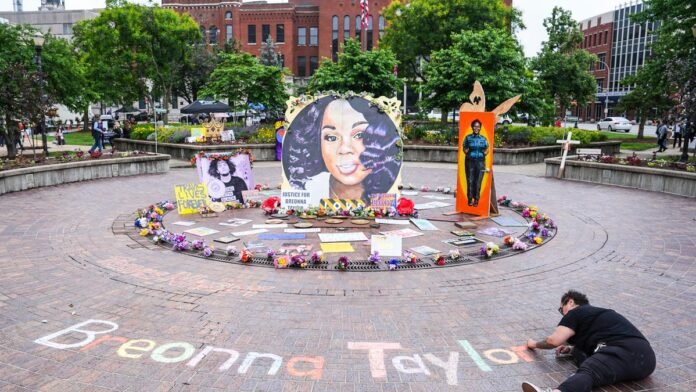DOJ’s one-day sentencing recommendation sends a chilling message. Across America, Black women disproportionately suffer police violence – and all too often their deaths are brushed aside.

US abandons police reform settlements with Minneapolis and Louisville
The Department of Justice announced it’d abandon police reform settlements with Minneapolis and Louisville.
- Former Louisville police officer Brett Hankison, convicted of violating Breonna Taylor’s civil rights, faces sentencing with the DOJ recommending only one day in prison.
- The author, Ben Crump, who represents Taylor’s family, argues this recommendation is inadequate and highlights the disproportionate police violence against Black women.
- Crump emphasizes the rarity of convictions in such cases and calls for justice, not vengeance, urging the judge to reject the DOJ’s recommendation.
- He cites other cases of Black women killed by police, like Pamela Turner and Sonya Massey, to underscore the systemic issue.
On Monday, July 21, a federal judge will sentence former Louisville police officer Brett Hankison for violating the civil rights of Breonna Taylor. And yet the Department of Justice, under Trump‑appointed leadership, has recommended just one day in prison, which Hankison may never serve due to time already credited. That recommendation is woefully inadequate and a profound insult to Breonna, her family – whom I represent – and to the Constitution’s promise of “equal protection of the laws.”
Across America, Black women disproportionately suffer police violence, and all too often their deaths are brushed aside. According to a 2024 study, Black women and girls are 40% more likely to be killed by police than White women, despite comprising just 15% of the female U.S. population. More than half of these deaths were callously classified as “collateral damage,” meaning the women were not even the intended targets of the police action that took their lives.
Adding insult to tragedy, convictions in these cases are nearly nonexistent. While fewer than 3% of police killings ever result in criminal charges, even fewer lead to convictions, especially for Black women. Our legal team has found no record of an on-duty police officer ever being convicted for killing a Black woman.
Breonna Taylor was killed in her own home during a no-knock raid that never should have happened. Hankison fired 10 shots blindly through a covered window and door. The fact that none of those bullets struck Breonna was chance, not restraint. A federal jury rightly found his actions violated her civil rights. The law says that matters, but the DOJ wants you to believe it doesn’t.
This is not about vengeance. It’s about accountability.
This one-day sentencing recommendation sends a chilling message that even when an officer is convicted of violating a citizen’s constitutional rights in a violent, deadly act, the penalty is little more than symbolic. It signals to police across the country that civil rights violations may come with no meaningful accountability, as long as the victim is Black.
Let’s be clear: this is not about vengeance. It’s about justice. It’s about enforcing the Constitution’s protections for all Americans, regardless of race, gender, income or zip code.
When federal prosecutors break from precedent to recommend an outrageously lenient sentence in a high-profile civil rights case, they undermine the very principles they’re sworn to uphold. It tells families like Breonna’s that even a conviction is not enough. It tells Black women that their lives, their rights and their humanity hold less value. And it tells the entire nation that the Constitution is negotiable.
Sadly, this goes beyond Breonna Taylor. It’s about Pamela Turner, a Black woman with a mental illness who was killed by police in Texas. It’s about Sonya Massey, a young Black woman in Illinois recently shot and killed by a sheriff’s deputy after calling 911 for help. Massey’s case hasn’t yet gone to trial, but how that case is handled will be another test of whether our justice system truly sees Black women as worthy of equal protection.
Again and again, Black women’s lives are devalued, their suffering dismissed, and their deaths met with silence or slaps on the wrist. These names are not footnotes. They are evidence that the system sees Black women as disposable, and it’s long past time for that to change.
Breonna Taylor’s mother is heartbroken, but she has hope for justice
The 14th Amendment doesn’t say “equal protection, unless you’re a Black woman.” It promises justice under the law for all. And yet, time and time again, the system refuses to extend that promise to Black women.
Breonna Taylor’s death was a preventable tragedy. And the lack of meaningful accountability for those involved is a national disgrace.
The judicial system must send a clear message: when police officers violate civil rights, they will be held accountable. The federal sentencing guidelines exist for a reason. They must be applied fairly, including when the victim is a Black woman.
Breonna’s mother, Tamika Palmer, is heartbroken and angry. Once again. The fact that neither of the officers who shot her daughter – Jonathan Mattingly and Myles Cosgrove – were charged with her killing, is a heartbreak that will never go away.
But she still holds out hope that the judge will reject this recommendation and do what the DOJ has refused to: honor the jury’s verdict, respect the law and the guidelines and recognize the value of her daughter’s life.
If we want to build an America that truly lives up to its ideals, we must start by valuing Black women in our communities and in our courtrooms. That means listening to their voices, protecting their rights, and delivering real consequences when those rights are violated. Anything less is not justice, it’s complicity.
Ben Crump is a nationally renowned civil rights attorney and founder of Ben Crump Law. Known as “Black America’s attorney general,” he has represented families in some of the most high-profile civil rights cases of our time, including those of Breonna Taylor, George Floyd, Tyre Nichols and Ahmaud Arbery.
